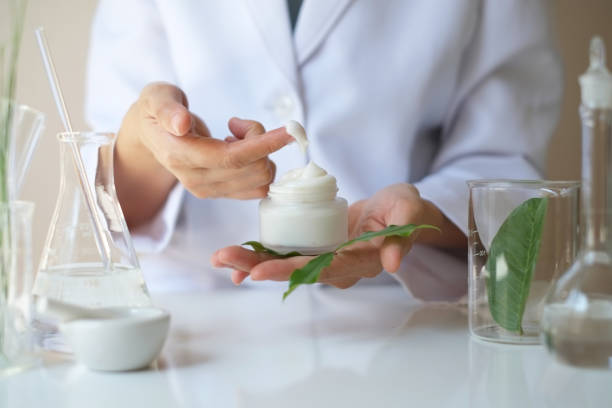There has been a higher demand for natural skincare products in recent years because people are now more mindful of the products they use on their skin. This shift can be attributed to a growing awareness of the potential harmful effects of synthetic ingredients commonly found in conventional skincare products.
With a focus on harnessing the power of nature’s bounty, natural skincare products offer a holistic approach to skincare that prioritizes health, sustainability, and efficacy.
What are Natural Skincare Products?
Natural skincare products are made with ingredients derived from plants, minerals, and other naturally occurring sources. These formulations often exclude synthetic chemicals, preservatives, and fragrances. They rely instead on the inherent benefits of botanical extracts, essential oils, and herbal remedies.
Understanding the principles and benefits of sustainable beauty products is essential for those looking to make the transition to a more wholesome and sustainable skincare routine.
Benefits of Natural Skincare Products

1. Gentle on the skin
One of the primary advantages of natural skincare products is their gentle and non-toxic nature. By avoiding harsh chemicals such as parabens, phthalates, and sulfates, natural skincare products minimize the risk of skin irritation, allergies, and other adverse reactions.
This gentle approach is particularly beneficial for individuals with sensitive skin or conditions such as eczema or rosacea. Such people may find conventional skincare products too harsh or exacerbating.
2. Reduced irritation and sensitivity
Many synthetic ingredients commonly found in conventional skincare products have been linked to skin irritation, inflammation, and allergic reactions. But when you opt for natural skincare alternatives, you can minimize the risk of adverse skin reactions and promote a calmer, more balanced complexion.
Natural ingredients such as aloe vera, chamomile, and calendula possess soothing and anti-inflammatory properties. This makes them ideal choices for sensitive or reactive skin types.
3. Environmentally friendly
In addition to benefiting the skin, natural skincare products also have positive implications for the environment. Sustainable sourcing practices, eco-friendly packaging, and biodegradable formulations are hallmarks of many eco-friendly beauty brands. It shows a commitment to environmental responsibility.
By choosing natural skincare products, consumers can minimize their ecological footprint and support practices that prioritize the health of the planet.
4. Sustainable sourcing
Natural skincare products often utilize ingredients sourced from renewable resources, such as organic farms, fair-trade cooperatives, and ethical suppliers. By prioritizing sustainable sourcing practices, these brands help preserve biodiversity, protect ecosystems, and support local communities.
Additionally, sustainable sourcing reduces the environmental impact associated with deforestation, habitat destruction, and pesticide use, further contributing to a healthier planet.
5. Biodegradable ingredients
Unlike many synthetic ingredients found in conventional skincare products, ingredients of natural skincare products are often biodegradable. This means that they can break down naturally without causing harm to the environment.
This biodegradability reduces the accumulation of non-biodegradable waste in landfills and waterways, minimizing pollution and promoting environmental sustainability. By choosing products formulated with biodegradable ingredients, consumers can support a cleaner, greener future.
6. Enhanced nutritional value
Natural skincare products are rich in vitamins, minerals, antioxidants, and other beneficial nutrients that nourish and replenish the skin. By harnessing the power of plant-based ingredients, natural skincare products deliver essential nutrients directly to the skin, promoting optimal health and vitality. From vitamin-rich botanical oils to antioxidant-packed fruit extracts, natural skincare ingredients offer a wealth of nutritional benefits for the skin.
7. Rich in vitamins and minerals
Most of the ingredients of natural skincare products are prized for their high content of vitamins and minerals, which play key roles in skin health and function. Vitamins such as A, C, and E possess antioxidant properties that help protect the skin from environmental damage.
However, minerals like zinc and magnesium support skin regeneration and repair. By incorporating these nutrient-rich ingredients into their skincare routine, individuals can promote a radiant, youthful complexion from the inside out.
8. Nourishing formulations
Natural skincare formulations are carefully crafted to nourish, hydrate, and rejuvenate the skin, using a blend of botanical extracts, plant oils, and herbal infusions. These nourishing ingredients penetrate deep into the skin’s layers, delivering essential moisture, vitamins, and antioxidants where they are needed most.
Whether it’s a hydrating moisturizer, a revitalizing serum, or a soothing facial mask, natural skincare products are designed to provide comprehensive care for all skin types.
Tips for Transitioning to Natural Skincare Products

Read Labels Carefully
1. Understanding Ingredient Lists
When transitioning to natural skincare products, it’s essential to become familiar with reading and interpreting ingredient lists. Look for products that have simple, recognizable ingredients derived from natural sources, such as plant extracts, essential oils, and herbal infusions. Avoid products that contain long lists of synthetic chemicals, preservatives, and artificial additives, as these may be harsh or irritating to the skin.
2. Recognizing certification labels
To ensure the authenticity and quality of natural skincare products, look for certification labels from reputable organizations such as the Soil Association, COSMOS, or Ecocert. These labels indicate that the product has met specific standards for organic ingredients, sustainable sourcing, and environmental responsibility. By choosing certified natural skincare products, consumers can have confidence in the integrity and purity of their skincare choices.
Start Slowly
3. Gradual replacement of products
Transitioning to a natural skincare routine doesn’t have to happen overnight. Start by gradually replacing conventional skincare products with natural alternatives as you finish each product.
Focus on key skincare essentials such as cleansers, moisturizers, and sunscreens, then expand your natural skincare collection over time. This gradual approach allows your skin to adjust to new ingredients and formulations without overwhelming your skincare routine.
4. Patch testing
Before incorporating new natural skincare products into your routine, perform a patch test to check for any adverse reactions or sensitivities. Apply a small amount of the product to a discreet area of the skin. You can also apply on the inner forearm or behind the ear, and observe for any signs of irritation, redness, or itching. If no reaction occurs after 24 to 48 hours, the product is likely safe to use on your face or body.
DIY Skincare Recipes
5. Homemade face masks
For those who prefer a hands-on approach to skincare, DIY skincare recipes offer a fun and creative way to pamper your skin with natural ingredients. Create your homemade face masks using simple kitchen staples such as yogurt, honey, oats, and fruits. These DIY masks can help nourish, hydrate, and rejuvenate the skin, leaving it feeling soft, smooth, and radiant.
6. Natural cleansers and toners
In addition to face masks, you can also whip up homemade cleansers and toners using natural ingredients such as apple cider vinegar and floral waters. These DIY skincare recipes provide gentle yet effective cleansing and toning benefits, helping to remove impurities, balance oil production, and tighten pores. Experiment with different formulations to find the perfect match for your skin’s needs.
Seek Professional Guidance
7. Consulting dermatologists or estheticians
When transitioning to natural skincare products, it’s helpful to seek guidance from skincare professionals such as dermatologists or estheticians. These experts can assess your skin type, identify specific concerns, and recommend suitable natural skincare products and treatments. Whether you’re dealing with acne, aging, or sensitive skin, a professional consultation can provide valuable insights. They can also personalized recommendations for achieving your skincare goals.
8. Researching trusted brands
With countless natural skincare brands on the market, it’s important to do your research and choose brands that align with your values and priorities. Look for brands that prioritize transparency, sustainability, and ingredient integrity, and avoid those that engage in greenwashing or deceptive marketing practices. Reading customer reviews, researching company ethics, and checking for certifications can help you make informed decisions about which brands to support.
Choosing the Right Products
9. Assessing skin type
Before selecting natural skincare products, it’s essential to assess your skin type and understand its unique needs and challenges. Whether you have oily, dry, combination, or sensitive skin, natural skincare products can address your concerns and promote balance and harmony. Consider factors such as hydration, texture, and sensitivity when choosing products tailored to your skin type.
10. Identifying specific skin concerns
In addition to skin type, it’s important to identify any specific skin concerns or conditions you may have, such as acne, aging, hyperpigmentation, or sensitivity. Natural skincare products often contain targeted ingredients and formulations designed to address these concerns and improve the overall health and appearance of the skin. Whether you’re seeking anti-aging serums, blemish-fighting treatments, or brightening solutions, there are natural skincare options available to help you achieve your skincare goals.
Incorporating Natural Skincare Products into Daily Routine

Morning Routine
- Cleansing: Start your day off right with a gentle yet effective natural cleanser to remove impurities, excess oil, and dead skin cells from the surface of your skin.
- Toning: After cleansing, follow up with a natural toner to balance the skin’s pH, tighten pores, and prepare the skin for moisturization.
- Moisturizing: Hydration is key to maintaining healthy, radiant skin, so be sure to moisturize your skin after cleansing and toning.
- Sun protection: Don’t forget to protect your skin from the sun’s harmful UV rays by applying a natural sunscreen with broad-spectrum protection.
Evening Routine
- Double cleansing: In the evening, start your skincare routine with a double cleanse to remove makeup, sunscreen, and impurities accumulated throughout the day.
- Treatment products: After cleansing, apply any targeted treatment products or serums to address specific skin concerns or goals.
- Hydrating masks or serums: Finish off your evening skincare routine with a hydrating mask or serum to replenish moisture, soothe irritation, and promote overnight renewal.
Maintaining Consistency and Patience
Understanding natural skincare timelines
When transitioning to natural skincare products, it’s important to understand that results may not be immediate and that patience and consistency are key. Unlike conventional skincare products that may deliver quick-fix results, natural skincare takes time to work with the skin’s natural processes and rhythms. Give your skin time to adjust to new ingredients and formulations, and be consistent with your skincare routine to achieve optimal results over time.
Allowing time for adjustment
As your skin adapts to natural skincare products, you may experience temporary changes or fluctuations in your skin’s appearance or texture. This adjustment period is normal and may include symptoms such as increased oiliness, dryness, or breakouts as your skin detoxifies and rebalances. Be patient and allow your skin time to acclimate to the new products, adjusting your routine as needed to address any concerns that arise.
Monitoring skin changes
Throughout your natural skincare journey, it’s important to stay attuned to your skin’s changing needs and adjust your routine accordingly. Pay attention to any changes in texture, tone, hydration, or sensitivity, and modify your skincare products and practices as needed to maintain a healthy, balanced complexion. Keep a skincare journal or diary to track your progress and note any improvements or setbacks along the way.
Potential Challenges and How to Overcome Them
Initial breakouts
When making a switch to natural skincare products, some individuals may experience temporary breakouts or purging as their skin adjusts to new products and ingredients. This process, known as purging, is a normal response to increased cell turnover and may manifest as small, temporary breakouts or blemishes.
To minimize purging, start slowly with new products, introduce one product at a time, and allow your skin time to acclimate to the changes. If breakouts persist or worsen, discontinue the use of the product and consult with a skincare professional for guidance.
Limited shelf life
Natural skincare products often have shorter shelf lives compared to their conventional counterparts due to the absence of synthetic preservatives. To maximize the longevity of your natural skincare products, store them properly in a cool, dark place away from direct sunlight and humidity. Avoid storing products in the bathroom, where temperature fluctuations and moisture levels can compromise their efficacy and stability.
Cost considerations
While natural skincare products may come with a higher price tag than conventional options, investing in quality products that prioritize ingredient integrity and effectiveness can be worth the cost. To make the most of your skincare budget, prioritize essentials such as cleansers, moisturizers, and sunscreens, and choose multipurpose products that offer multiple benefits in one.
Conclusion
Transitioning to natural skincare products is a journey that offers numerous benefits for both your skin and the planet. By choosing products formulated with gentle, non-toxic ingredients derived from nature, you can promote healthy, radiant skin while minimizing your environmental footprint.
Whether you’re looking to reduce irritation, support sustainability, or enhance your skincare routine, natural skincare products offer a holistic approach that prioritizes health, efficacy, and integrity.







